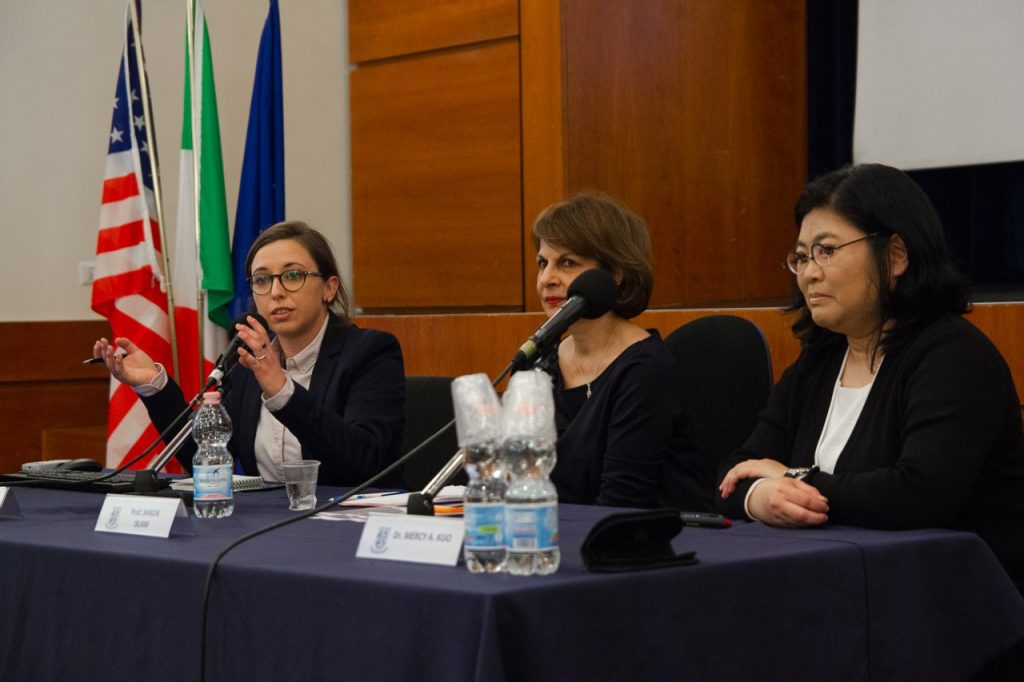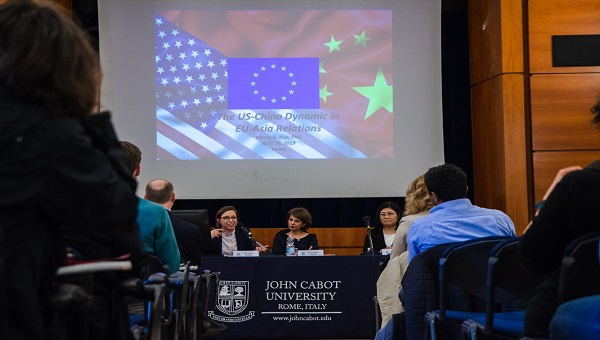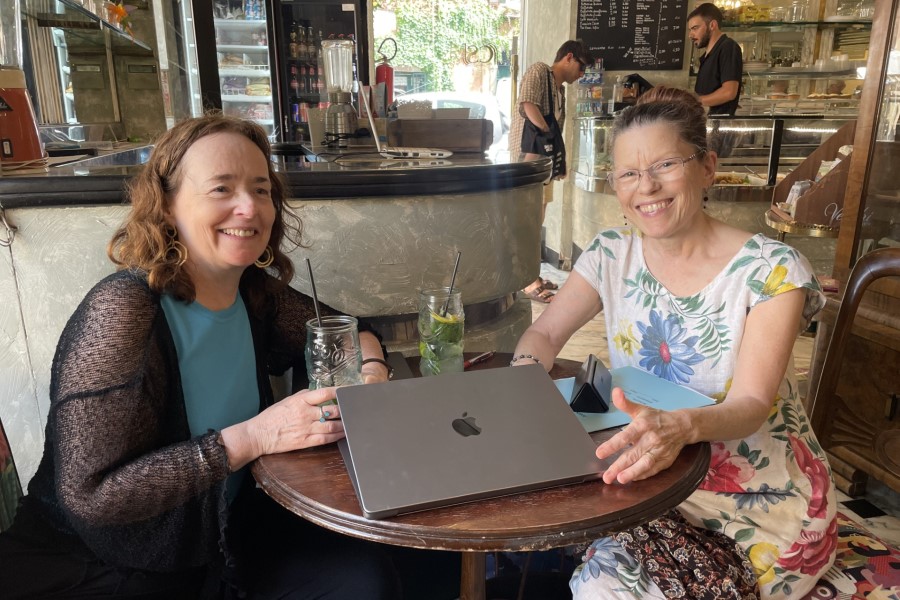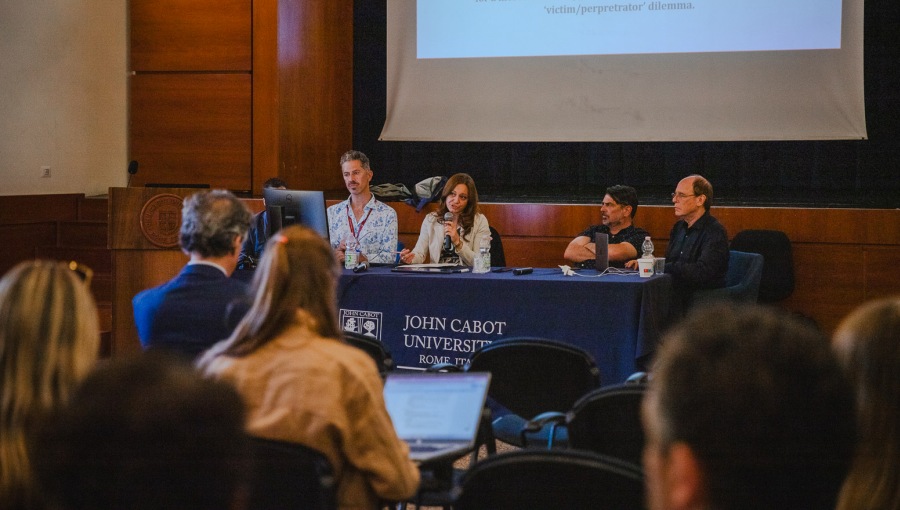New Game Changers in the European Union-Asia Relationship
John Cabot University hosted an international conference on ‘New Game Changers in the European Union-Asia Relationship’ in collaboration with Istituto Affari Internazionali (IAI) on April 17, 2019. The conference brought speakers from Europe and Italy to Rome to discuss the different drivers shaping the relationship between the European Union and Asia. The discussion highlighted important changes taking place both within Europe and Asia as well as in multi-lateral and bi-lateral relationships. Special attention centered on new European partnerships with China’s Belt and Road Initiative (notably Italy and Greece) as well as the recent EU-China Summit. Each session also highlighted the challenges and opportunities for enhanced EU-Asia engagement, with a range of opinions and suggestions from a deepening of business ties and greater reflection on Asia’s role within Europe to a revamping of shared values with the region in the area of human rights and rule of law.
Speakers
Speakers included Shada Islam from Friends of Europe in Brussels, Mercy Kuo a columnist for The Diplomat and Vice President of Pamir, Gulia Pompeli of Italy’s Il Foglio, Christopher Hughes of the London School of Economics, Antonio Fiori of the University of Bologna, Giuseppe Gabusi of the University of Turin, Romeo Orlandi of Italy-ASEAN (Association of Southeast Asian Nations), Nicola Casarini of IAI and Bridget Welsh of JCU (the latter two organized the conference).
Shifts Impacting EU-Asia Relations
In the rich discussion setting the context, the first panel focused on the broad shifts impacting EU-Asia relations. Attention centered on seven major developments – 1) tensions in the Transatlantic relationship between Europe and the United States arising during the Trump administration, 2) fragmentation caused by internal splits within the European Union, especially from Brexit, 3) the important rise of China not only as the second largest global economy but through its embrace of its global leadership role under Xi Jinpeng, 4) dynamics in the China-US relationship and pressures to adopt positions in binary contentions over trade and security, 5) an increasing importance of other Asian powers, notably Japan, India and to a lesser extent ASEAN, economic realignments driving Europe toward Asian markets, and 6) changes taking place in global connectivity, industry and digital governance. These changes have contributed to greater attention and engagement between the EU and Asia, in which the EU has had to face the difficult challenge of navigating a path in its interest(s). It has not helped that the EU is also often divided over the positions to adopt in Asia. While acknowledging the greater attention the EU has placed on revaluating the relationship, the speakers highlighted the need for a more understanding of Asia in Europe and visa-versa as well as a recognition that much of the relationship is being driven by factors outside of the control of Europe, namely China and the United States.
Developments in Northeast Asia

From left to right: Giulia Pompili, Il Foglio, Shada Islam, Friends of Europe, Mercy Kuo, Pamir and The Diplomat
The second panel centered on developments in Northeast Asia. Special attention focused on Taiwan, which faces a presidential election next year in 2020. Recent developments between China, Taiwan and the United States illustrate the challenge Europe has in making an impact in Asia, but at the same time speak to the need to think carefully about the role that Europe should play in defending its shared values. It was noted that Europe will need to take a stand over pressures being placed on democracy in the region. It was also highlighted that Britain has played an important leadership role in the relationship with Asia and with Brexit this will change and require other European countries to be more engaged and aware of what is happening in Asia. Scholars also discussed the complex issues in the nexus of South and North Korea and the recent summit in Hanoi between the United States and North Korea. It was noted that although the summit has been described as a failure, the fact that there is dialogue speaks to progress. South Korea has played a very important leadership role in promoting this dialogue, even though it is facing serious domestic political and economic challenges at home. It was argued that the EU, especially the UK and France, can play an important role in deepening talks and forging greater security over areas of nuclear use, given the apparent recent hardening and breakdown of the US and North Korea positions surrounding the Hanoi Summit. In addressing issues in Japan, speakers highlighted the changing security role the country in playing under the Abe administration, which is transforming its regional relationships. The strength of the Japan-EU relationship was argued as an important platform for the EU to build on moving forward. Finally, attention centered on the China Belt and Road Initiative and its impact for Europe. It was stressed that there is often a gap between the rhetoric and the reality of developments and thus a need for careful review of what is actually happening on the ground and its implications. It was also acknowledged that Europeans often do not understand the strategic and cultural assumptions in China’s foreign policy approach, and in reflecting on the BRI and why different countries in Europe are adopting new ties and new forms of connectivity, further review is needed of who is winning and losing in these developments.
Southeast Asia
The final panel centered on Southeast Asia. Scholars showcased the central role that Europe has played in the region’s history and continues to play in the region’s economy. It was stressed that strengthening economic ties between Southeast Asia and Europe are essential for both region’s mutual development and security. Relations with the two regions have also showcased the difficulties in balancing concerns with and conflicts over values, security and economic interests. This was illustrated with special focus on recent developments in the South China Sea, which have involved serious questions of the rule of law and an expansion of China’s territorial ambitions. There has been no consensus within ASEAN on these issues, and interestingly, increasing divisions within Europe itself on these issues with a tension between values and interests. The different positions in the South China Sea not only showcase divisions, but also highlight the increased role of China globally and how positions taken in Asia affect dynamics within Europe itself. This theme was also echoed in the discussions of domestic developments in Southeast Asia, with special attention to elections in Thailand, Indonesia and the Philippines. China is playing a larger role in domestic affairs of Southeast Asian countries and there are tensions over democracy and authoritarianism being played out across the region. There are shifts taking place with a rise of identity and issue-based politics as countries are facing increased pressures from citizens, especially younger voters, to perform. It was noted that Europe’s presence in the region is essential as a check on China’s power, as well as an important vehicle to strengthen shared democratic values globally. It was acknowledged that recent tensions over palm oil and the breakdown of the strategic partnership highlight the need for increased dialogue to strengthen the relationship.
The conference as a whole is part of a growing dialogue in Europe over Asia and an important step to expand discussions in countries such as Italy where there are gaps in the understanding of the complex developments in the region.
Read the article in The Diplomat: “EU-Asia Relations: New Game Changers“






